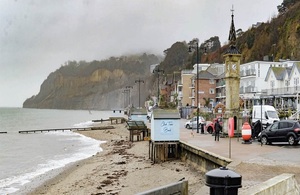- £66m deal supports construction of facilities for Classic Fashion Apparel Industry
- Planned site in Aqaba expected to create 4,000 jobs for Jordanians.
- Announcement made at British Ambassador’s Residence in Amman, in presence:
- British Ambassador to Jordan Ms Bridget Brind OBE
- UK Minister of State for Asia and the Middle East Ms Amanda Milling MP
- Classic Fashion Apparel Industry CEO Mr Ramdas Sreedharan Nair
UK Export Finance (UKEF), the UK Government’s export credit agency, announced its first deal in Jordan to support Classic Fashion Apparel Industry in the construction of four new garment factories and a corporate office in Aqaba.
The deal, worth £66m, will facilitate the building of four factories including three satellite manufacturing units as well as the Aqaba main facility. This will enhance Jordan’s already strong textile industry. UKEF has provided support through a combination of direct lending and a buyer credit guarantee, allowing Classic Fashion Apparel Industry to move swiftly with their project and benefit from flexible repayment terms.
The new planned site located in Aqaba Special Economic Zone is expected to create around 4,000 jobs for Jordanians by 2024. Jobs for the local community are offered at varying levels, with the potential to grow and the opportunity to enter the business of garment manufacturing. This unique location is in close proximity to Aqaba port and gives Classic Fashion Apparel Industry an exporting advantage. This project will contribute to boosting manufacturing exports and jobs, in line with the targets for the sector contained in the recently launched Economic Modernisation Vision 2033.
The UK’s support will extend beyond the funding scheme, as more than 30% of the services and supplies for the project, such as machinery and other building materials, will come from directly from UK providers. ASGC UK, a leading British construction company in the region, will project manage and oversee all related elements to ensure quality and timely delivery.
ASGC UK, Managing Director Paul Woodman said:
ASGC is delighted and honoured to be part of this landmark project in Jordan. We would like to thank Classic Fashion, HSBC and UK Export Finance for their support and cooperation in putting together the commercial and financial arrangements that have made this project possible. We are privileged to count Classic Fashion as a client and hope this project will lead to further opportunities for ASGC in Jordan. Lastly, I would like to thank the British Embassy and the Department for International Trade in Amman for their support throughout the entire process as we would not have secured this prestigious project without their assistance.
Classic Fashion Apparel Industry Group is the largest apparel manufacturer in the MENA region. It produces around 550,000 garments per day and contributes to over 42% of all garment exports from Jordan. The company produced 130 million garments in 2021 and expects production to grow to 165 million garments this year.
Classic Fashion Apparel Industry Chairman & Managing Director Mr Sanal Kumar said:
My humble journey of life and what I have achieved today started based on a self-realisation that “you can raise yourself to your highest potential and deliver 100% of what you are capable of”. Today Classic Fashion is the outcome of this simple thought. I would love to make this statement today that Classic Fashion is committed to giving its best to the deserving people in the rural areas of Jordan.
Also, I would like to emphasize that Classic Fashion will put all its might into being instrumental in achieving His Majesty’s vision 2033.“To Take Jordan Apparel Sector to Its Pinnacle by Jordanisation, Vertical Expansion, Bringing SME Units into Open-Source Manufacturing Excellence Program, And Efficiency Enhancement.
I thank UKEF, British Embassy, and Department for International Trade in Amman & HSBC for coming along and supporting Classic Fashion in its journey of creating another 4000 jobs for Jordanians with the new set up in Aqaba of GIA Apparels- a fully owned entity of Classic Fashion.
Through UKEF, the UK can help international buyers access finance and insurance when it is not available from the private sector. UKEF has made up to £3 billion available to help Jordanian buyers access the finance they need to trade with the UK. The full range of UKEF support is available to help finance priority projects in Jordan.
British Ambassador to Jordan Ms Bridget Brind OBE said:
I am delighted to welcome this ground-breaking deal with Classic Fashion as the first to be backed by UK Export Finance in Jordan with the involvement of British company ASGC UK. It will help create new jobs and increase exports, contributing to Jordan’s economic growth and future prosperity. I hope it can act as a success story which can inspire more similar agreements in the future for the benefit of Jordan and the United Kingdom
UK Minister of State for Asia and the Middle East, Ms Amanda Milling MP, who is visiting Jordan as part of a regional visit welcomed the initiative and the opening of a new apparel and textiles factory in Aqaba, which will create thousands of jobs in Jordan.
With an open and friendly business environment, and expertise in sectors ranging from energy such as renewable, water sustainability, manufacturing and construction to services and technology, the UK is a trusted partner for Jordan. UKEF can also offer Shariah-compliant (Islamic Sukuk) finance products and offer support in local currencies such as Jordanian Dinars.


